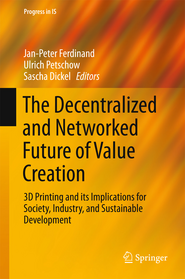New publication: How 3D printing decentralizes value creation
Recent technological changes as well as social and organizational innovations have spurred a broad transformation of dominant means and ends for value creation. A fundamental transition has begun: from big, centralized factories to far more decentralized places of production. New forms of value creation emerge due to “disruptive elements” such as “FabLabs”, “Maker-” or “hackerspaces”. Those new labs have technologically advanced profiles, allow individuals access to production technologies and are accompanied by digital ideas of Open Source Hardware or Open Innovation.
The implications of digitalization and decentralization for society, industry, and sustainable development are described in the book “The Decentralized and Networked Future of Value Creation“, co-authored by researchers from the Institute for Ecological Economy Research. The authors focus on the particular example of 3D printing, because the 3D printer is considered a key technology for “Industry 4.0” and simultaneously strengthens decentralized commons based communities. It thereby represents conflicting priorities for the future society. In addition to evaluating 3D printing’s disruptive potentials against a broader economic background, it also addresses social and ecological implications.
Can Open Source Hardware Disrupt Manufacturing Industries?
While the means of production used to be exclusive and limited, new labs with technologically advanced profiles nowadays allow a wider access to modern industrial production forms. Therefore, they are often considered “disruptive elements”: the decentralization of digital productivity prospectively seems to finally reach the sphere of materialistic productivity, as the editors Jan-Peter Ferdinand, Ulrich Petschow and Sascha Dickel illustrate.
The volume consists of eleven chapters, including individual views on decentralization, emphasizing economic, technical, social and environmental perspectives. For example:
- Tobias Redlich and Manuel Moritz observe that organizational boundaries dissolve as many stakeholders (suppliers, customers, users, community member, etc.) become part of value (co-)creation processes. Thus, the need for a new understanding and taxonomy of value creation emerges to describe and fully understand these new phenomena based on the principles of hybrid and heterogeneous bottom-up economics.
- At the intersection of production and consumption, Christoph Ihl and Frank Piller address new possibilities for consumers to participate in production. The authors propose the concept of “FabStores”, i.e. decentralized mini-factories close to the market intersecting with consumer activity during localized manufacturing processes.
- The idea of “Do-it-yourself” could go even further: in Fabrication Laboratories (FabLabs), 3D printing can become a production machinery for everyone. By establishing a new kind of infrastructure, this would strengthen grassroot- and bottom-up-movements, as Peter Troxler describes.
- What is the environmental impact of decentralized production? Jan-Peter Ferdinand, Heike Flämig, Ulrich Petschow, Michael Steinfeldt und Anton Worobei tackle this question in their joint contribution. By comparing different case studies, they show that under certain circumstances, the use of 3D printing technologies can reduce the need for transportation and may also result in a more favorable LCA for product life cycles.
The book originated from the research project “The Potential of Advanced Technological, Decentralized and Personalized Production against the Background of a Low Carbon Economy”, funded by the German Federal Ministry of Education and Research (BMBF). With the project “Commons-based Peer Production in Offenen Werkstätten” (COWERK), funded by the BMBF program Social-ecological Research (SÖF), the IÖW is currently analyzing together with partners how new technological methods in the context of decentralized and community-based production are used and which impact they have with regard to a sustainable development (www.cowerk.org).
++++++++++++++++++++++++++++++++++++++++++++++++
Bibliographic Information:
Ferdinand, Jan-Peter; Petschow, Ulrich; Dickel, Sascha (Editors, 2016): The Decentralized and Networked Future of Value Creation. 3D Printing and its Implications for Society, Industry, and Sustainable Development, ISBN 978-3-319-31684-0, 255 pages, 47 illustrations
More information about the book, including a printable cover:



